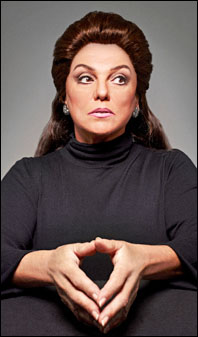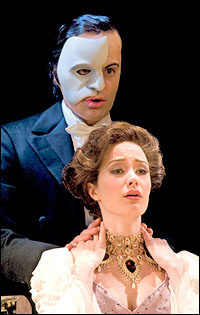
*
After originating the role of Ariel in the Disney musical The Little Mermaid on Broadway, and portraying soprano Christine Daaé in both the Las Vegas company of The Phantom of the Opera and the world-premiere sequel Love Never Dies, in London, actress Sierra Boggess is again stateside.
Playbill.com caught up with Boggess during the preview period of the Broadway revival of Terrence McNally's Master Class, in which she portrays Juilliard classical-voice student Sharon opposite stage and screen veteran Tyne Daly as formidable soprano Maria Callas.
Were you familiar with the role or the play before you auditioned?
Sierra Boggess: No. I knew the play existed and I knew about Maria Callas and that's as far as it went for me. When this audition came around, I still didn't know much except that my agent told me it was the role Audra McDonald played and won the Tony for. Luckily, I got to chat with Audra when we presented an award together recently.
| |
 |
|
| Tyne Daly as Maria Callas |
SB: She told me about how much this role and this play changed her life. I was already feeling that having gone into rehearsals. Only after just a week of rehearsals I felt so honored to be a part of this play, playing this role and getting to be on stage with Tyne Daly — it's such an extraordinary thing. But hearing Audra talk about it confirmed how I was already feeling, and it lit that fire inside me. Luckily, I didn't see her do it, so I'm not comparing myself to her. And obviously, Audra McDonald and I are very different, so I can feel like I can honor the part in the same way I would want anyone to honor a role I created.
Master Class really speaks to artists about the nobility of what it means to be an artist and to create, but it also applies to how we live our lives.
SB: That's exactly how I feel every night. I'm not in the first act. So, I have a whole routine where I turn up the [monitor] so I can hear everything that's going on on stage. I've heard the play over and over again by now, but there are certain lines that stick out to me. Things that Callas is saying. Even though she's not a great teacher — she's actually the worst kind of teacher — but, still, as a student, you go away having a life-changing experience.
I also have to remember that it's Terrence McNally. These aren't quotes from Maria Callas, this is Terrence McNally's genius brain. Callas is the vehicle for what he's saying. It's all about artists. When Callas is talking about artists and looks at the audience and asks, "Where would you be without us? Think about that?" I love that. She's right. That's why you come to the theatre, because you want to be swept up by artists. Callas is teaching these students that it's not just about the way you sound. She was such a raw performer.
How did this role come about? Where you looking do to a straight play? You're so well known as a musical theatre actress.
SB: Power of intention. I really believe it. I was in London, living there for 18 months doing Love Never Dies. I was playing Christine Daaé ten years [after the action of The Phantom of the Opera] — she has become a famous opera singer. So, I was researching opera a bit more, just to enhance my take on Christine. And Jack O'Brien, who directed me in that and is one of the most extraordinary human beings I've ever met in my life, was the first person to ever really talk to me about Maria Callas, especially about her vocal intelligence when she sings "Casta Diva." So, I got a recording of it and listened to it for the first time. I was really experiencing who she was and how different she was than the other opera singers I had listened to.
So this was a year before I even had an audition for Master Class. I was also thinking that I wanted to do straight plays, because of working with Jack, who is such an actor's director. I was bitten by the bug of wanting to do a straight play.
But I also know how difficult it is once you get into musical theatre, especially Disney. You can very easily be pigeonholed, with people saying, "She's a Disney princess for the rest of her life." I want my career to be full of many different things, not just one strict track. But this play came up, and I'm singing in it, Oh my God am I singing in it!, but I certainly want to keep doing plays as well.
| |
 |
|
| Ramin Karimloo and Sierra Boggess in Love Never Dies. | ||
| photo by Catherine Ashmore |
SB: I always do a lot of preparation, but for Master Class even more so. It's funny, I'm in less of a show than I ever have been, but I'm prepared more than I ever have been, if only because this is so out of my training. I'm not opera-trained. I have a degree in musical theatre, but I've always been able to sing soprano. I have a naturally high coloratura range, but I'm sort of self-taught when it comes to opera. I've always been in love with La Bohème, so in school I would go to the library, Xerox Mimi's arias and then to go a practice room and sing them.
So, personal passion helped for Master Class?
SB: Well, I have to sing not only an aria — it's not just any aria — it's Lady Macbeth. I can't even begin to tell you the amount of people, who are classical musical people, who said "Oh, no. You have no business singing that aria." But most women don't touch that until they're well into their 30s or 40s. So, I had a lot of people telling me "You can't do this." So, that just fires me up even more and gives me the fire to say, "Watch me."
I know I would never in a million years play Lady Macbeth in Verdi's opera. But that's who Sharon is. And she decides that's what she wants to sing. …I mean she is going in there 100 percent committed to singing these difficult songs.
So, I worked with my longtime voice teacher twice a week and then at the Met with Bob Morrison, who changed my life because he has directed Macbeth a few times at the Met, so he worked with me on the sound, on the intention, on the character. I haven't looked at Macbeth since high school, and before that I played Banquo in middle school!
I was also studying at Juilliard, with Marlena Malas, who is the top vocal teacher there, as well as Coradina Caporello, who is the Italian dialect coach there. I felt like I was a student again. I loved every single second of my preparation for this. I was scared, intimidated, but I just allowed myself to be that. I was doubting myself and I truly can't believe I'm singing Verdi on Broadway. You also have Stephen Wadsworth at the helm, who's no stranger to opera and Juilliard. What sort of dynamic does that bring to your process?
SB: Stephen is so very helpful. He's an extraordinary director. He teaches at Juilliard as the head of opera studies. So, I got to sit in on one of his classes before we even started rehearsal. He's such an open and giving teacher and that's exactly how he is as a director. He has a very clear vision. A lot of times he is very much like a professor when he talks to us. He's such a perfect choice for Master Class, because he has such knowledge, and lived that at Juilliard. He said, "I can't tell you how many students I've had to scoop up off the floor and put back together after they're just destroyed by master class situations."
Master Class speaks for Maria Callas beautifully, but Stephen wanted to make sure the students — that our voices are also heard. He brings great insight into the life of a Juilliard student. It also gives us more to play off. It's about how she infects each of us with a different thing. And it's so important to see that the students come in one way and walk off the stage as a changed individual.
You've spent plenty of time on stage exploring your operatic range before this as Christine in Phantom and Love Never Dies. How much did that prepare you for this?
SB: I had dinner with Andrew Lloyd Webber on Monday and I had to thank him, because if I hadn't been doing Love Never Dies, I don't think my voice would have been in shape enough to even audition and sing that Verdi aria for Master Class.
Andrew and I have a relationship in that I understand his music and I sing in a way that he enjoys for his music to be sung. Especially Love Never Dies, it's one of the most beautiful scores, and he writes like an opera. So, I was singing eight shows a week, essentially singing an opera and living like a nun. So, I really feel like my voice really got into opera shape.
Since you're the first actress to have played Christine Daaé at both ends of the spectrum in Phantom and Love Never Dies, can you tell me about what that journey was like?
SB: It's funny. The first time I saw the show as a kid I wanted to be Meg. I always wanted to be a prima ballerina. Christine has also been such a dream role for me. I remember always singing along with the album and trying to hit that high E flat that she sings. I can't even tell you what an absolute joy and privilege I had to originate that role in Las Vegas, which is five years running, and to then revisit the character that I love so much and play her ten years later with Love Never Dies and work with Andrew again. I feel blessed.
Initially, when I started Love Never Dies, I looked at all the notes I was given by Hal Prince for the original Las Vegas run. And then I realized, ten years later I'm a different person, [and] I was also playing Christine in Love Never Dies at the exact same age she would have been ten years after Phantom. She's a very different person. And also Jack O'Brien had a whole other life that he was breathing into it. So, it was about me bringing what I know from the first production, which is the dysfunctional, crazy but overly-loving thing that she has with the Phantom, but also knowing that she's now changed.
If Love Never Dies does make it to Broadway, would you want to revisit the role?
SB: Absolutely. I really love the show. I can't say enough amazing things about the score. I love Andrew and I love what Jack did with it in London. I had the best time doing that. I really believe in that character.
(Adam Hetrick is staff writer for Playbill.com. His work also appears in the pages of Playbill magazine.)


Matthew-Murphy.jpg)







